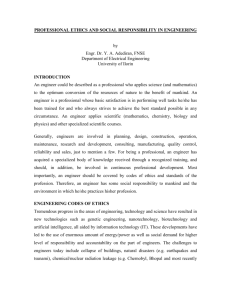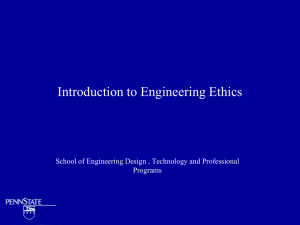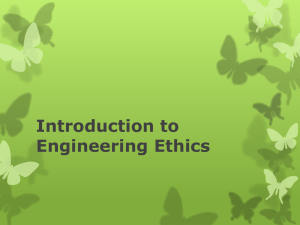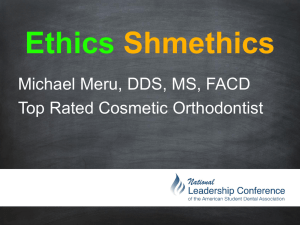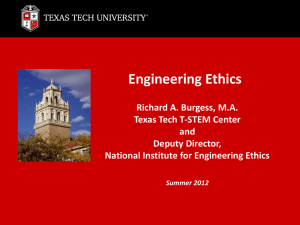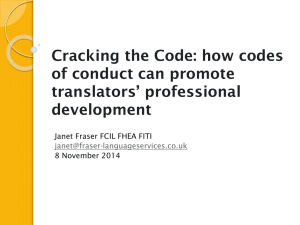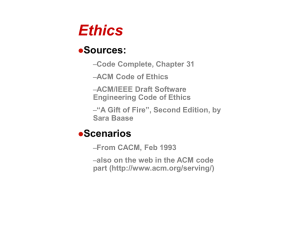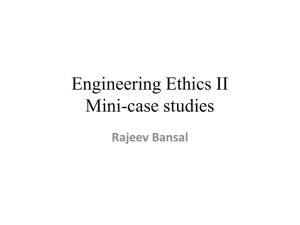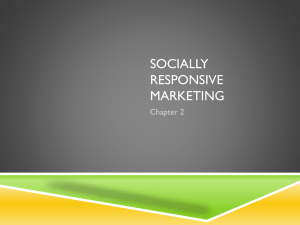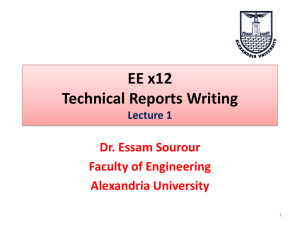Introduction to Engineering Ethics
advertisement
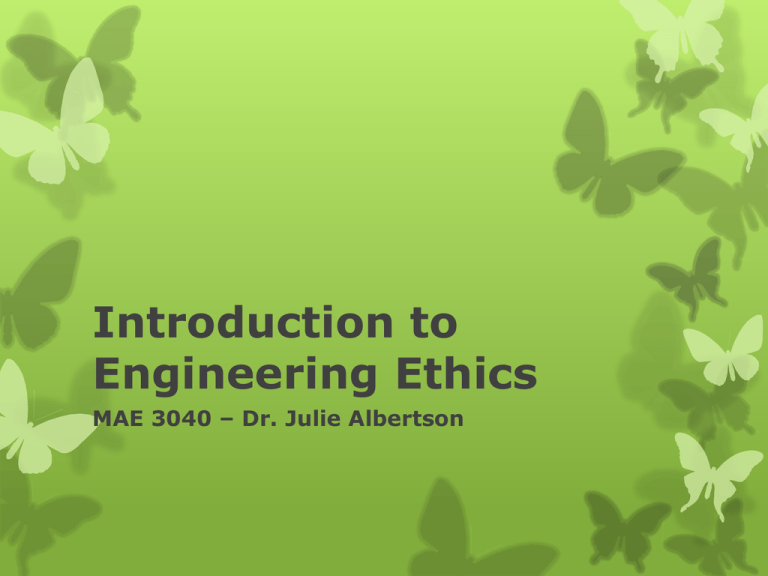
Introduction to Engineering Ethics MAE 3040 – Dr. Julie Albertson Meet Your Instructor From Spokane Washington PhD in Mechanical Engineering from Washington State University At UCCS full time since 2005 Currently live in Florissant Spend large quantities of time on my 95 retirement acres north of Palmer Lake COMPLETELY at the mercy of my dogs, Sage and Shilah 2 3 Why Teach Engineering Ethics? BS in Mechanical Engineering Technical Education Ethics & Morality Preparation PREPARATION Workplace Dilemmas 4 Technical Choices Personal Conflicts Define Ethics, Engineering Ethics, & Morality 5 An Engineer’s Responsibilities Family, Upbringing, Personal Values & Ethics Firm: Engineers, Managers, Colleagues Industry, Other Firms Global Environment, Society, & Nature Engineering Profession Law, Government, Public Agencies Clients or Consumers 6 Engineering: Managing the Unknown Consistently lack knowledge about problems and designs Engineering Design = creating NEW products and processes Questions Questions Questions How will it be used? How well does it work? How well does it need to work? Will it affect people? In a beneficial way? Can it be misused? What happens if it breaks? Is it safe? Do we have to deal with all safety concerns? You will never be absolutely certain as an engineer. Rather, you must be as prepared as possible when limited by time, resources, and funding. You must see into the future and understand the consequences of your work 7 We Each Bring Something Different to the Table Objectivity People Skills History Emotion Culture Background Upbringing Expertise Experience Problem Solving Skills 8 Consider One Example Close to Home – The Hanford Green Run Overview of the Green Run o Late 1940’s – Hanford Site Center of Plutonium Production o Iodine 131 – Byproduct of Plutonium Production o Air Force needed to test viability of new radiation monitoring system o Dec 2nd & 3rd 1949 “The Green Run” o Not disclosed until 1986 From a George Washington University Analysis (http://www.gwu.edu/~nsarchiv/radiation/dir/mstreet/commeet/meet8/b rief8/tab_h/br8h7.txt) … In the Green Run, the value of national security seems to have trumped other ethical concerns. In addition, if today's environmental regulations were in place in 1949 they could have been circumvented by the executive branch. We can ask whether the Green Run should have happened, but perhaps more importantly, we should ask whether current regulations provide sufficient protection against analogous cases in the future 9 Professional Codes of Ethics 10 What Defines a Professional? Advanced Expertise – skills and knowledge Formal Education – not just practical training and/or apprenticeship Self-Regulation – setting standards, drafting codes of ethics, enforcing these Representing Profession before the public and government Public Good – occupation serves some aspect of public good. Consider how this defines Mechanical Engineering 11 Fundamental requirement is for engineers to provide faithful, honest, professional service 12 Codes of Ethics Guide conduct and decision making of engineers Similar between societies What’s a society? Check out the American Society of Mechanical Engineers Your Turn: Professional Codes PowerPoint 13 National Society of Professional Engineers Engineers' Creed As a Professional Engineer, I dedicate my professional knowledge and skill to the advancement and betterment of human welfare. I pledge: To give the utmost of performance; To participate in none but honest enterprise; To live and work according to the laws of man and the highest standards of professional conduct; To place service before profit, the honor and standing of the profession before personal advantage, and the public welfare above all other considerations. In humility and with need for Divine Guidance, I make this pledge. Adopted by National Society of Professional Engineers, June 1954 Source: http://www.nspe.org/Ethics/CodeofEthics/Creed/creed.html 14
